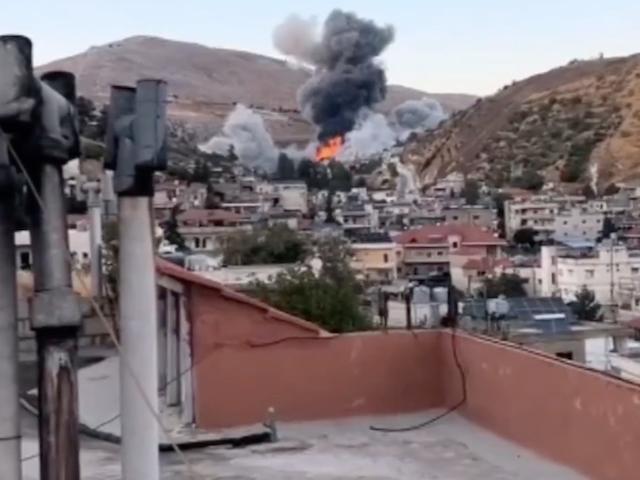Hezbollah unleashed a massive barrage of rockets on Israel’s northern regions, with devastating impacts on civilian areas. Two individuals were injured by shrapnel in Kibbutz Sa'ar in the Western Galilee, with one reported to be in serious condition and the other moderately wounded, as confirmed by Magen David Adom (MDA) ambulance service Director-General Eli Bin. This aggressive act by Hezbollah sent shockwaves through the region, reigniting fears of a broader conflict and underscoring the increasing danger faced by civilians in northern Israel.
A Region Under Siege: Waves of Rocket Fire Across the Galilee
The attack on Kibbutz Sa'ar was just one component of a much larger and more coordinated assault. Hezbollah’s rockets rained down on various parts of the Western, Central, and Upper Galilee, as well as the Wadi Ara region, triggering air raid sirens and sending residents scrambling for shelter. The Israel Defense Forces (IDF) confirmed that Hezbollah launched a staggering total of 30 rockets into the Western Galilee and towns situated east of Haifa, while another 40 rockets targeted central northern cities.
This is Kibbutz Sa’ar in northern Israel that was hit by a Hezbollah rocket this morning.
— Ariella (tortured poet version) (@ariellakimmel) September 25, 2024
A rocket that was targeting Israeli civilians. A rocket that has seriously injured civilians and destroyed their homes.
But you won’t hear the ceasefire now crowd condemning them. pic.twitter.com/63onBEi8t2
Safed, a historical city in northern Israel, was particularly hard-hit, with chilling video footage capturing rockets landing within the city limits. Miraculously, no casualties were reported in Safed, though the barrage caused significant structural damage, including a direct hit on a residential home. The whereabouts of the inhabitants remain unknown. A nursing home in Safed was also struck, but, once again, no injuries were reported.
זירת הנפילה בקיבוץ סער, בה נפצעו 3 אנשים pic.twitter.com/vTaY8WM1J8
— ישראל היום (@IsraelHayomHeb) September 25, 2024
Hezbollah’s Calculated Assault on Civilians
In a disturbing development, Hezbollah claimed responsibility for the rocket assault, boldly declaring that they targeted the IDF Northern Command headquarters in Safed. However, the reality on the ground paints a different picture. Hezbollah's indiscriminate rocket fire primarily endangered Israeli civilians, striking residential areas and even targeting sensitive institutions like nursing homes.
The IDF responded with precision strikes on Hezbollah’s terror infrastructure, focusing on weapons depots and known launch sites. Yet, in contrast to Hezbollah's deliberate use of civilian areas as shields, Israel's military operations are guided by a policy of avoiding civilian casualties. The IDF remains firm in its stance: it does not embed its military operations within civilian homes, schools, or playgrounds—unlike Hezbollah, whose tactics demonstrate a blatant disregard for the lives of its own people and those in Israel.
🚨 HEZBOLLAH ROCKET LAUNCH FROM LEBANON HITS ASSISTED LIVING FACILITY IN SAFED, NO INJURIES REPORTED 🚨
— Matthew Feinberg (@thewebbie) September 25, 2024
A rocket launched by Hezbollah from Lebanon hit the northern Israeli city of Safed, causing damage but no reported injuries, according to MDA.
The IDF spokesperson reported… pic.twitter.com/E20MXMmsEJ
While Hezbollah launches rockets from civilian areas, exposing Lebanese residents to the threat of Israeli retaliation, Israel ensures its military bases, even if in proximity to civilian zones, operate under strict protocols to minimize the risk to non-combatants. The IDF’s strikes on Hezbollah’s terror sites—some of which are embedded within residential structures—are conducted with care, aimed at dismantling the militant group’s capacity to continue its barrage while minimizing harm to innocent bystanders.
Escalating Tensions: Israel Warns Lebanon
The situation escalated further on Wednesday, as reports emerged of Israel scattering leaflets over the village of Kahale in the Mount Lebanon region, not far from the critical Beirut-Damascus highway. According to Saudi network Al Hadath, the leaflets issued a stark warning to residents, urging them to evacuate within two hours. This move underscores Israel's commitment to minimizing civilian casualties, even in hostile territory, by giving ample warning before any potential military operations.
the capital of the Beqaa district, is a Christian city (with a clear Christian majority), with about 120 thousand inhabitants, from where the Zahlé arak comes... (2/2)
— Abu Ali Express English (@AbuAliEnglishB1) September 25, 2024
The leaflet drops serve as a clear message to Hezbollah and the Lebanese government: Israel will not tolerate the use of Lebanese civilians as human shields, and it will take whatever measures necessary to neutralize the growing threat posed by the terror group.
The Bigger Picture: Hezbollah’s Role in the Region
The recent barrage of rockets is just the latest chapter in Hezbollah’s long-standing campaign against Israel, a campaign driven by Iran’s ambitions in the region. Hezbollah, a proxy for Iran, has continued to exploit the fragile political situation in Lebanon to turn the country into a staging ground for its aggression against Israel. The group’s actions not only endanger Israeli civilians but also threaten to destabilize Lebanon further, dragging its people into a conflict they neither seek nor benefit from.
✡️🇮🇱Secondary explosion and rocket firing following the bombing of Hezbollah's ammunition depot in Lebanon👏👏💪💪🇮🇱💙🇮🇱 pic.twitter.com/9aQvOuGsOj
— alex,אלכס🎗🇮🇱💙🇮🇱💙🇮🇱 (@Alex134526262) September 25, 2024
As the situation continues to unfold, northern Israel remains on high alert, with shelter-in-place orders affecting dozens of localities. The possibility of further escalation looms large, as Hezbollah's provocations push the region closer to a wider and potentially devastating confrontation.
Secondary explosions of munitions destroyed in residential area in Lebanon are clearly visible pic.twitter.com/MPn7TZ1seV
— Boris Shamuilov (@BorisShamu47884) September 25, 2024
In the face of this unrelenting aggression, Israel stands firm in its right to defend its citizens and ensure the safety of its people. Hezbollah’s tactics of hiding behind civilian infrastructure and recklessly targeting population centers make it clear who the true aggressor is in this conflict.


